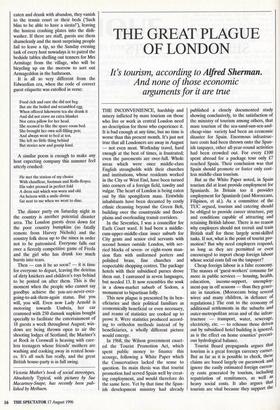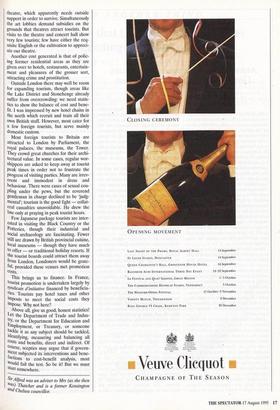THE GREAT PLAGUE OF LONDON
It's tourism, according to Alfred Sherman. And none of those economic arguments for it are true THE INCONVENIENCE, hardship and misery inflicted by mass tourism on those who live or work in central London need no description for those who experience it. It is bad enough at any time, but no time is worse than this present month. It's just not true that all Londoners are away in August — not even most. Workaday travel, hard enough at the best of times, is frustrated; even the pavements are over-full. Whole areas which were once middle-class English strongholds with their churches and institutions, whose residents worked in the City or West End, have been turned into corners of a foreign field, tawdry and vulgar. The heart of London is being eaten out by this spongiform mass. Erstwhile inhabitants have been decanted by costly ethnic cleansing beyond the Green Belt, building over the countryside and flood- plains and overloading transit corridors.
In the Seventies, I was a councillor for Earls Court ward. It had been a middle- cum-upper-middle-class inner suburb for City gents and senior civil servants with second homes outside London, with ser- ried blocks of seven- or eight-room man- sion flats with uniformed porters and polished brass, fine churches and respectable shopping centres. The package hotels with their subsidised purses drove them out. I canvassed in seven languages, but needed 13. It now resembles the souk in a down-market suburb of Sodom, a monument to bipartisan folly.
This new plague is presented by its ben- eficiaries and their political familiars as economically beneficial or even necessary, and reams of statistics are cooked up to prove it. Were statistics produced accord- ing to orthodox methods instead of by beneficiaries, a wholly different picture would emerge.
In 1968, the Wilson government enact- ed the Tourist Promotion Act, which spent public money to finance this scourge, following a White Paper which the Conservatives lacked the sense to question. Its main thesis was that tourist promotion had served Spain well by creat- ing employment, and would therefore do the same here. Yet by that time the Span- ish development ministry had already
published a closely documented study showing conclusively, to the satisfaction of the ministry of tourism among others, that mass tourism of the sea-sand-sun-sex-and- cheap-vino variety had been an economic disaster for Spain. Enormous infrastruc- ture costs had been thrown onto the Span- ish taxpayer, other all-year-round activities had been crowded out. For every f100 spent abroad for a package tour only £7 reached Spain. Their conclusion was that Spain should promote or foster only cost- less middle-class tourism.
But as the White Paper noted, in Spain tourism did at least provide employment for Spaniards. In Britain too it provides employment for Spaniards (and Moroccans, Filipinos, et al.). As a committee of the TUC argued, tourism and catering should be obliged to provide career structure, pay and conditions capable of attracting and retaining British labour. There is no reason why employers should not recruit and train British staff for these largely semi-skilled tasks. If not, what is the point of tourist pro- motion? But why need employers respond, so long as they are permitted or even encouraged to import cheap foreign labour whose social costs fall on the taxpayer?
Cheap foreign labour is a false economy. The masses of 'guest-workers' consume far more in public services — housing, health, education, income-support, unemploy- ment-pay in off seasons — than they gener- ate in taxation. (Moroccans bring several wives and many children, in defiance of regulations.) The cost to the economy of additional settlements in the suburbs and outer-metropolitan areas and of the infras- tructure — transport, water, sewerage, electricity, etc. — to rehouse those driven out by subsidised hotel building is ignored, as is the effect on home counties' precari- ous hydrological balance. Tourist Board propaganda argues that tourism is a great foreign currency earner• But as far as it is possible to check, these claims are based largely on guesswork and ignore the easily estimated foreign curren- cy costs generated by tourism, including repatriation of remittances, as well as heavy social costs. It also argues that tourists are vital because they support the
theatre, which apparently needs outside support in order to survive, Simultaneously the art lobbies demand subsidies on the grounds that theatres attract tourists. But visits to the theatre and concert hall show very few tourists; few have either the req- uisite English or the cultivation to appreci- ate our theatre.
Another cost generated is that of polic- ing former residential areas as they are given over to hotels, restaurants, entertain- ment and pleasures of the grosser sort, attracting crime and prostitution.
Outside London there may well be room for expanding tourism, though areas like the Lake District and Stonehenge already suffer from overcrowding: we need statis- tics to show the balance of cost and bene- fit. I was impressed by new hotel chains in the north which recruit and train all their own British staff. However, most cater for a few foreign tourists, but serve mainly domestic custom.
Most foreign tourists to Britain are attracted to London by Parliament, the royal palaces, the museums, the Tower. They crowd great churches for their archi- tectural value. In some cases, regular wor- shippers are asked to keep away at tourist Peak times in order not to frustrate the progress of visiting parties. Many are irrev- erent and immodest in dress and behaviour. There were cases of sexual cou- pling under the pews, but the reverend gentleman in charge declined to be 'judg- mental% tourism is the good fight — collat- eral casualties unavoidable. He drew the line only at praying in peak tourist hours.
Few Japanese package tourists are inter- ested in visiting the Black Country or the Potteries, though their industrial and social archaeology are fascinating. Fewer still are drawn by British provincial cuisine, local museums — though they have much to offer — or traditional holiday resorts. If the tourist boards could attract them away from London, Londoners would be grate- ful, provided these venues met promotion costs.
This brings us to finance. In France, tourist promotion is undertaken largely by syndicats d'initiative financed by beneficia- ries. Tourists pay hotel taxes and other Imposts to meet the social costs they impose. Why not here?
Above all, give us good, honest statistics! Let the Department of Trade and Indus- try, or the Department for Education and Employment, or Treasury, or someone tackle it as any subject should be tackled, identifying, measuring and balancing all costs and benefits, direct and indirect. Of Course, sceptics may argue that if govern- ment subjected its interventions and bene- factions to cost-benefit analysis, most Would fail the test. So be it! But we must start somewhere.
Sir Alfred was an adviser to Mrs (as she then was) Thatcher and is a former Kensington and Chelsea councillor.



















































 Previous page
Previous page